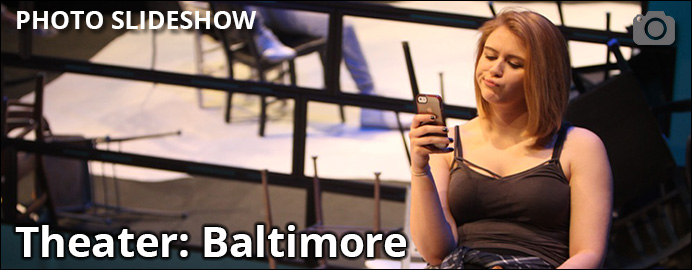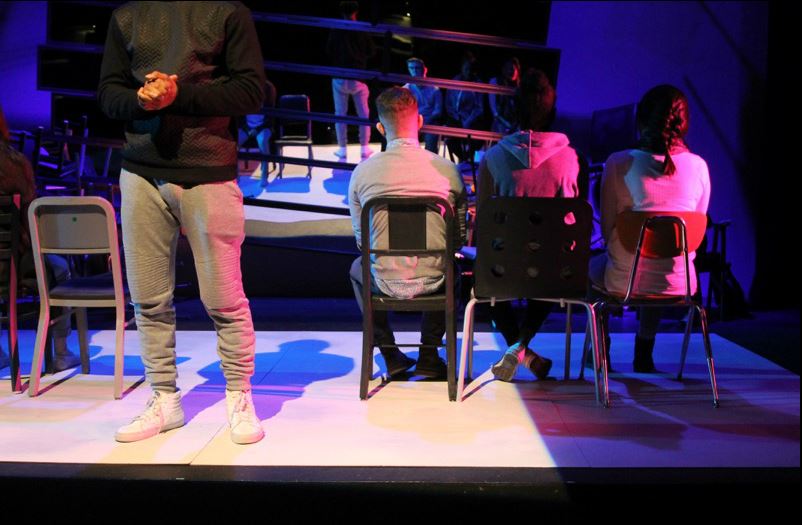The UI Theater Department will début Baltimore this weekend, portraying diverse students’ conversations about racial identities.
By Cassandra Santiago
Bulging eyes sit above a colossal nose and plumped lips spread in a distracting grin. Sitting in front of a caricature artist is a self-inflicted, self-focused humor. No harm done.
Except when such a caricature targets a black student on a college dorm floor, forcing the newly hired resident assistant to re-evaluate her post-racial society beliefs. So goes Kirsten Greenidge’s Baltimore, which will open at 8 p.m. today in the Theater Building’s Theater B.
Iowa’s production is the third in a rolling world première commissioned by the Big Ten Theater Consortium. The group selected works by four female American playwrights with the goal of promoting the writing and production of work about women by professional and academic theaters across the country. Each play, available to Big Ten theaters before anywhere else, must feature at least six major, age-appropriate roles for young women.
Baltimore follows eight undergrads from different ethnicities, backgrounds, and sexual orientations as they navigate conversations and realizations about the complexities of race.
“It’s a great play in the way that it forces you, really forces you, to hear everybody out, even if you don’t agree,” said JaMaya Austin (Leigh). “It’s a well-rounded piece, and the race issue is spoken about in a different way.”
Playing Leigh, whom she described as having a “dominant personality” and a talent for “lighting the fire,” presented some challenges, Austin said.

“It’s not very often as an actor that you get to do things that are current,” Austin said. “You don’t get to do things that are like, ‘Oh, I could just use my regular language.’ You could just be yourself, and so I have to make sure I don’t get too comfortable.”
But the dense subject matter of race and identity, for some, might bring anything but feelings of comfort. Marc Saladino, an economics major, was challenged when tasked with portraying Carson, an adopted white student with lesbian mothers and a Chinese grandmother.
“He has a struggle with his sexuality that I never really had,” Saladino said. “So that was hard. Obviously, I’ve had my struggles with talking about race. I’ve had friends who are minorities, and I didn’t know how to deal with it because I grew up in a town with mostly white people, and I grew up from a place of privilege.”
Unfamiliarity with the content aside, Greenidge’s efforts to combine a diverse set of people with differing life opinions didn’t backfire.
“Everyone was really open-minded, really unbiased and, even if their character was saying or doing something that they wouldn’t personally do, they understood the message that was trying to be presented, and they really lent themselves to that,” Austin said.
First-time assistant director Chelsea Wing said the play will continue to generate “avenues of discourse about these issues.”
“The play doesn’t present a perfect model for how to approach these things,” Wing said. “It’s presenting a really disastrous circumstance, but I think that kind of thing happens so easily that we need to see it happening in order to figure out a better way to respond to it.”
Perfect model or not, Baltimore could prove beneficial to how the UI approaches diversifying campus.
“I admire and appreciate that Iowa is making some strides in specific areas, but there are many other areas that need our attention as well, which include faculty and student retention, accessibility, and support for students from underrepresented communities and creating a safe environment for instruction and discourse,” said director Tlaloc Rivas in an email. “Safe in the sense that no opinion is shut down or freedom of expression is abridged or compromised and that uniting behind the idea that we can make a better university for all if we all strive for more allocation of resources and programs to help our departments grow and thrive.”
THEATER
Baltimore
When: 8 p.m. Friday-Saturday, 2 p.m. March 27
Where: Theater Building Theater B
Admission: Free for UI students, $5 for nonstudents



